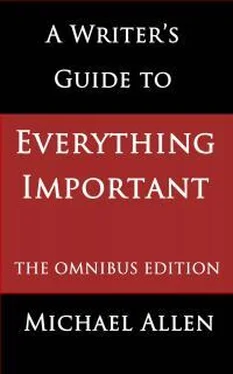This particular individual belonged to the chuck-it-on-the-canvas-and-see-what-happens school. After the artist had done his thing for half an hour or so, he and Mostel sat down for a cup of coffee.
After a few minutes Mostel heard a pitter-patter sort of noise. He turned round to see what was causing it, and then he said, ‘Why John – you’ve put so much paint on the canvas that it’s dripping down on to the floor.’
‘Oh, that’s all right,’ said the ‘artist’ airily. ‘I mean it to do that.’
Yeah, yeah.
Whatever else you do, I implore you, do not fall into the trap of thinking that anything which you have written is automatically wonderful, just because you wrote it.
18. Down with expressionism
Expressionism is the word used to describe a theory which is perhaps as old as the Greeks, but which in modern times derives from the writings of Tolstoy and Croce; it was then developed by writers such as E.F. Carritt ( Theories of Beauty , 1914) and R.G. Collingwood ( The Principles of Art , 1938).
The central doctrine of expressionism is that a work of art is an expression of the artist’s emotion; this ‘expression’, in the form of a novel or painting or symphony, communicates the artist’s emotion to the public (the observer or punter).
At the heart of the theory of expressionism is a belief in the overwhelming importance of ‘genuineness’ in the emotion expressed. Superficial emotions (whatever they are), or mere frivolous entertainment, are frowned upon.
An artist might have, in life, a series of horrible experiences which generated numerous negative emotions – terror, despair, and anguish, perhaps. These experiences might leave the artist severely depressed, and even psychologically damaged beyond repair. It would then be considered perfectly in order, in terms of expressionist theory, for the artist to seek to recreate these horrible experiences, and to generate the deeply unpleasant and disturbing emotions, in the reader of a novel or the audience for a play. Not only would a work which did that be considered good art, by the expressionist believer, but it would also be considered the only kind of work which is worthy of being called art at all. Everything else is mere hackwork.
Expressionism, in short, is considered by its advocates to be a pretty good thing. More than that, any work of art which fails to conform with the tenets of expressionism is considered to be a bad thing.
I have some comments.
My first comment is that we must distinguish between a kind of writing which is therapy for a writer, and writing which is designed to do something valuable and helpful for the reader. Expressionism seems to me to be mainly the former. (And I note, in passing, that reliving unpleasant experiences very often slows down, or prevents, the very natural and desirable process of allowing the disturbing memories to fade away as quickly as possible.)
Second, expressionism seems to imply that, if a work of art is to be satisfactory and admirable, it must inevitably seek to convey to the observer the same emotion as that which the artist herself experiences. It also seems to be implied in expressionism that the artist can only create good art if she is experiencing a ‘genuine’ emotion while she is actually at work.
I disagree with both of these ideas. I think it is perfectly possible to create a work of art which generates, in the observer, an emotion quite different from that which is being, or has been, experienced by the artist.
There is a story from the early part of the nineteenth-century which illustrates this point. At that time there was a well-known English music-hall performer called Grimaldi. He is often described as a clown, but in our terms ‘comic entertainer’ might be a better description. He did acrobatics and tumbles, and was famous for his comic songs.
The story goes that one day a middle-aged man went to see his doctor. He looked exhausted, thoroughly run down, and was clearly at the end of his physical tether. He complained of all the usual stress-related symptoms: couldn’t sleep, had indigestion, felt depressed....
The doctor examined him and then said: ‘You know, there’s nothing fundamentally wrong with you, old chap. You’ve just let things get a bit on top of you. What you need to do is relax more. I tell you what – why don’t you go and see this man Grimaldi at the Empire Theatre? He’s terrific fun. When people come out of that theatre you can see from their faces that they’re feeling so much better than when they went in. That Grimaldi fellow is a tonic in himself.’
‘Ah yes,’ said the patient with a sad smile. ‘But you see, I am Grimaldi.’
In fact, poor Grimaldi paid a high price for making other people laugh. He retired at the age of forty-five, worn out and almost crippled from the strain of his highly physical performances.
Actors, of course, and notably those trained in the method school of acting, are notoriously keen on the idea that it is important for the actor to feel genuine emotion as he works. However, experienced directors take a different view of the matter. Ingrid Bergman related, at a tribute to Alfred Hitchcock, how she had once been discussing a scene with him. Hitchcock told her what he wanted, but Ingrid hesitated; she told him that she wasn’t sure that she could deliver that particular emotion.
Hitchcock gave her a beady look and said firmly: ‘Ingrid – just fake it.’
Third comment. Expressionism can be interpreted, and often is, as implying that the very fact that the artist herself has experienced a particular emotion makes it, in some unspecified way, emotion of a more important and valuable kind than that experienced by mere mortals.
This is another version of the idea which I have attempted to demolish earlier in the chapter, namely the idea that there is a hierarchy of sensitivity. All too often, the expressionists would have us believe that the artist is some sort of special being, more worthy of our admiration, sympathy and respect than is the old woman across the road. And this idea is, of course, warmly embraced by those who consider themselves to be ‘artists’ and therefore somebody special.
I now ask again, as I did earlier, to be shown the evidence to support this contention. Why is your (the artist’s) emotion any more important than mine? Even if I am a street-sweeper and you are a Booker prizewinner, I submit that we both feel the same emotions. If you believe otherwise, kindly show me the evidence.
Next comment, which is really an expansion of the previous one. The doctrine of expressionism can all too easily be perverted into a chant of ‘me-me-me, aren’t I wonderful?’ by the infantile and the self-centred – of whom there are great numbers in the writing community. (Actors are the only group I know of who are quicker than writers at converting any given state of affairs into a service of worship which centres upon themselves.)
But we do not admire selfish and self-centred individuals in the world at large. At best they are merely tiresome; at worst they are psychopaths and criminals. So why should we admire such people in the arts?
An artist is a creature driven by demons, said William Faulkner. And many an immature mind has replied, Yes, and I am a creature driven by demons, and therefore I am an artist; and therefore I must be taken seriously and judged at my own evaluation; here endeth the lesson.
In this book I have pointed out that a cry commonly heard among those writers who consider themselves acutely sensitive, incredibly talented, and wholly unappreciated, is: I want to express myself!
What they usually mean by this is something along the following lines: I am a natural-born genius (because I say so). It is the duty of all right-thinking publishers to accept, immediately and without question, anything that I condescend to permit them to publish. All discerning critics will heap unstinting praise upon my head. Suitably fawning sycophants may be allowed to present me with the enormous cheques which are undoubtedly my due, on Thursdays at four p.m., provided they don’t take too long about it.
Читать дальше












